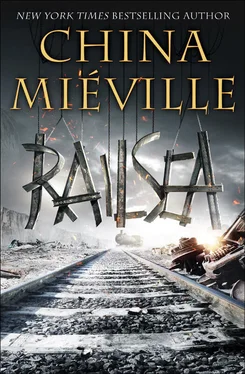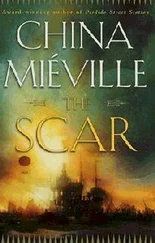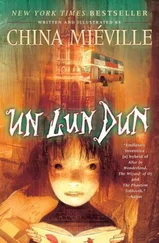Many of those whose paths he crossed on the same old runs would barely have spoken to him before. Despite the years of lessons they had taken together, he knew them less well than he did his trainsmates. & he was not much more smooth now than he had been while at school. But he was a traveller, who had gone out & come back, & that meant he had stories. He told Timon & Shikasta & Burbo of the mole rats & the great southern moldywarpe. & they listened, no matter that, now he spoke not to his own cousins, his delivery was hesitant. Encouraged by the attention, Sham introduced the listeners to his bat. That sealed it.
They were a temporary gang, & they trekked across the roofs of Streggeye’s industrial quarter, hooting & breaking the windows of deserted halls, flirting & bickering, Daybe wheeling around them in curiosity, ducking through the forest of steam- & smoke-venting chimneys. They watched the comings & goings in markets in the busiest streets of the prosperous parts of town, & in the other places, they entered defunct warehouses, set up camps in the cold boilers of unusable ovens.
Some of the time, they talked about salvage.
STREGGEYE WAS NOT FAMOUS for salvors. Of course those searchers in old earth, those disinterrers of oddities, were from everywhere & nowhere. The various collective names they granted themselves tended to refer to that very fact: they were the Diffuse College, you might hear; they were the Scattered Siblinghood; the Antiplaced; the Universal Diggers.
Small as it was, though, Streggeye was no backwater. It provided a disproportionate amount of the molemeat & the philosophy in the railsea. It was known among explorers & updivers for its Stonefaces, the gazing rock figures that topped the island, above the treeline in unbreathable highlands air. (Sham had visited the viewing stations below the transit zone, peered through long mirrored-&-lensed periscopes at the blocky gazing heads on the island’s top.) So though it was not their first port of call, salvors did, in fact, periodically visit Streggeye. More than once Sham had watched salvage trains come in.
They were like no other rolling stock on the railsea. Patchwork vehicles. Powerful engines, wicked shunters at the front, train sides riveted with cladding, bristling with the peculiar tools of the salvor’s trade. Drills, hooks, cranes, sensors of various unorthodox kinds, to find & sort through the millennia of discarded rubbish that littered the railsea. Bits of salvage used & incorporated. On the topside decks salvors themselves in their distinctive clothes, tool-belts & bandoliers & stained leather chaps, snips of treated cloths & plastic feathers & showy bits & pieces pulled from the earth & miraculously unruined. Helmets of various complicated designs.
First the city authorities would come aboard & bargain for what salvage they wanted. Then high-rolling clients, the Streggeye rich. & finally, if the salvor crews were feeling generous & had a few days, they would run a market.
Their antique & reclaimed wares were set on stalls on the dockside, according to various taxonomies. Pitted & oxidized mechanisms from the Heavy Metal Age; shards from the Plastozoic; printouts on thin rubber & ancient ordinator screens from the Computational Era: all choice arche-salvage, from astoundingly long ago. & the less interesting stuff, too, that discarded or lost anything from a few hundred years ago to yesterday—nu-salvage.
There might even be a table or two of items from the third salvage category. The physically disobedient impossible scobs, that looked & behaved like nothing should. Sham remembered one such object—or was it three? A Strugatski triskele, the salvor had called it, waving it around to attract interest. Three curved black rods equidistant from each other in a Y-shape. The man had held one, & above it jutted the others, & in the centre, where they should join, was nothing. They did not touch, though they stayed together no matter how you shook them.
What that was was a piece of alt-salvage. Something made not only epochally long ago but unthinkably far away, way beyond the farthest reaches of the upsky. Brought to the railsea, used, & discarded by one of the visitors from other worlds, remnants brushed from cosmic laps, during the long-ago years when this planet had been a busy layby, a stopover point for the same brief visits that had accidentally stocked the upsky with its animals. This world had been a tip. Frequented by vehicles en route from one impossibly far place to another, with trash to dump.
The thought of striking out to salvage-reefs unknown, the burrowing, the mining, dustdiving, the picking through shorelines of ancient trash—these activities quickened Sham’s blood. But then what? He had questions. Where did salvage end up? What happened when you’d found it? Who used it for what when whoever sold or bartered it did, to whomever?
&, though it was harder to think of, a last thing gnawed at him & he could not leave it alone—when he thought of salvage, why did Sham start awed & end up deflated?
THERE WAS A WRECK IN A BAYFUL OF FIDDLY RAILS AT Streggeye’s eastern rim, just out of town. It was a few hundred yards from shore, a stalled & rusting engine & cart that had long ago lost power—a bad captain, a drunk crew, inadequate switchers. It was too ruined to fix, worth nothing as nu-salvage. It mouldered, full of rust-dwelling birds, cawing in outrage as Daybe flew around their home.
Timon, Shikasta & Sham were alone on the pebbly beach. They sat near a gorge where a stream of water & a railriver—a line, a long loop of track—emerged from inland & joined the railsea. They threw stones at the old engine offshore. Timon & Shikasta talked. Sham, still surprised at being in their company, watched the animal dwellers of shallow coastline earth. Meerkats, groundhogs, the tiniest moldywarpes. Shikasta, as bossy as she had been at school, but now unaccountably noticing him, looked at Sham until he blushed.
“So you going to be a moler’s doctor, Sham?” Timon said. Sham shrugged. “Going to turn out like your boss? No one knowing if you’re a man or a woman?”
“Shut up,” Sham said uncomfortably. “Fremlo’s Fremlo.”
“I thought you wanted to go into salvage.” Timon said.
“Talking of,” interrupted Shikasta, “want to see something cool? He’s right, salvage was the only thing ever made you perk up. So I wanted to show you something.” From her bag she took a thing that looked somewhat like a switcher’s remote control. It was black plastic or ceramic, a peculiar shape. It glimmered with lights. Bits poked from it according to absolutely no sense. It came out with a murmur as if of troubled flies.
Sham’s eyes widened. “That’s salvage,” he gasped.
“It is,” said Shikasta proudly. She brought out a box of things the size of grapes, soldered with ugly circuitry.
“That’s alt -salvage,” Sham said. Junk from another world. “How’d you get it?”
“Off a trainmate.” Shikasta, like Sham, was working on the railsea—a transport vehicle, in her case. “She got it from someone else, who got it off someone else, & on & on, leading back to Manihiki. She said I could have a go on it.”
“Oh my That Apt Ohm,” said Timon. “You blatantly stole it.”
Shikasta looked prim. “Borrowing ain’t stealing,” she said. “I wanted to show you,” she said. “Can you make your bat come here?”
“Why?” said Sham.
“I ain’t going to hurt it,” she said. She held up one of the grapey things. There was a clip on it.
Sham stared at Daybe, circling in the air. Somewhere in the back of his brain were stories he’d heard, about some of the capabilities of some of the things left in some of the seams of some of the salvage. Somewhere was a little idea.
Читать дальше












